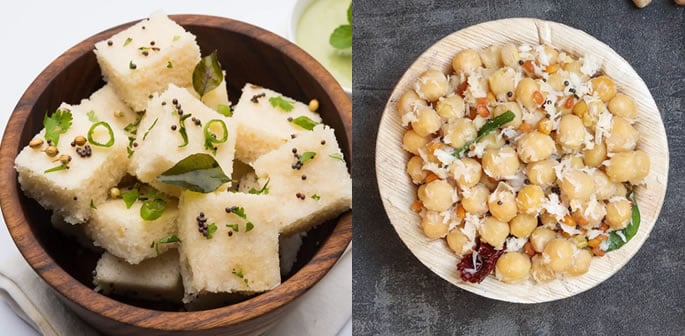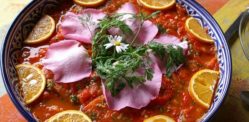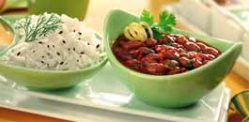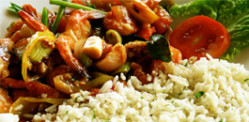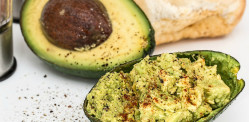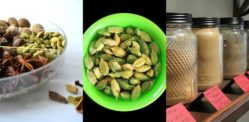Who can resist a soft, tangy dhokla
Navratri is a season of rhythm, colour, and flavour: nine nights when celebrations extend from music and dance into the kitchen.
It is also a time of fasting, when meals are lighter and carefully chosen.
These recipes are ideal for Navratri because they follow traditional fasting guidelines, avoiding grains, refined flour, and heavy dairy, while still offering energy, nutrition, and flavour.
Ingredients like tapioca pearls, buckwheat flour, seasonal vegetables, legumes, and paneer provide protein and carbohydrates in a form that is easy to digest and satisfying.
Once the fast is broken, the table transforms with dishes that feel indulgent without being heavy.
Navratri is as much about keeping flavours alive as it is about celebrating tradition, and these recipes bring festive, fasting-friendly food straight to your kitchen.
Here are five recipes to try this Navratri.
Chawal Dhokla
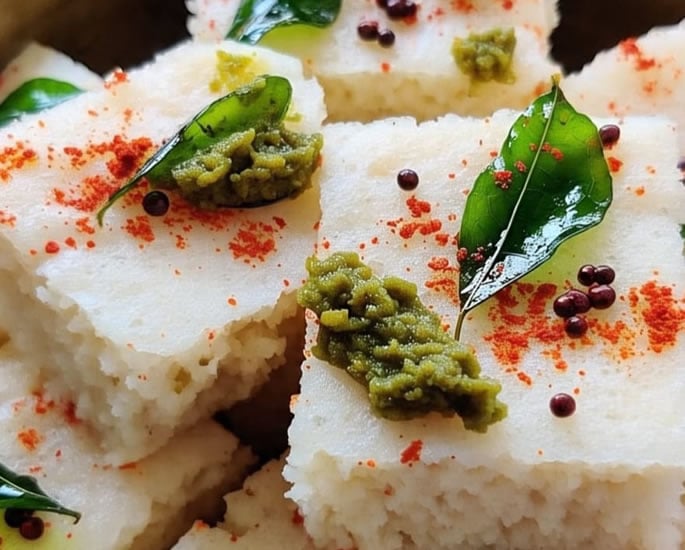
Who can resist a soft, tangy dhokla served with fresh chutney?
This Gujarati snack is elevated with ghee, cumin, curry leaves, and whole red chillies.
What makes it unique is the use of samvat chawal, a rice traditionally reserved for Navratri, giving this fermented version an authentic, seasonal flavour.
Ingredients
- ¾ cup samvat chawal
- 1 cup sour yoghurt
- 1 tsp ginger paste
- Green chilli paste to taste
- 1 tsp rock salt
- 2 tsp oil/ghee
- 2 dry red chillies
- 7 Curry leaves
- 1 tsp cumin seeds
For Garnishing
- Coconut, grated
- A small bunch of coriander, chopped
Method
- Lightly roast the rice in a pan, taking care not to let it brown.
- Prepare the batter by mixing the rice with rock salt, chilli paste, ginger paste, and yoghurt. Leave the mixture to ferment overnight; it should become slightly spongy.
- Grease a cake tin with a little ghee and transfer the batter into it.
- Place the tin into a steamer and cook for 20 minutes.
- Test if it is done, then let it cool.
- In a small pan, heat some ghee or oil. When hot, add cumin, whole red chillies, and curry leaves. Allow to sizzle, then pour over the cooked dhokla.
- Cut the dhokla into serving pieces and serve garnished with coriander and coconut.
This recipe was inspired by NDTV Food.
Potato Pakora
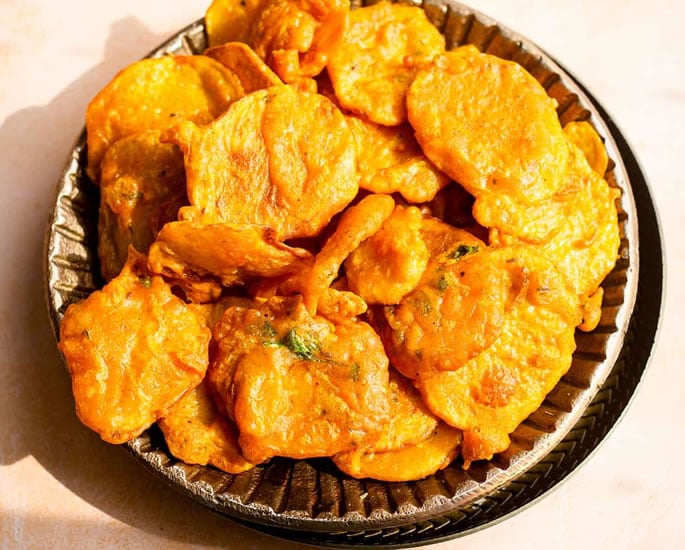
Potato pakoras are a crunchy, spiced snack perfect for Navratri.
Made with gluten-free buckwheat flour, they adhere to fasting guidelines while still offering a satisfying, flavourful treat.
Crispy on the outside and soft inside, these pakoras turn everyday potatoes into a festive indulgence that’s both traditional and easy to enjoy during the fasting period.
Ingredients
- 1 cup buckwheat flour
- 2 tsp rock salt
- ½ tsp chilli powder
- 250ml water
- 2 Potatoes, peeled and sliced
- Oil, for deep frying
Method
- In a bowl, make a batter by mixing the flour, salt, chilli powder, and water. Adjust the water to get a smooth, thick consistency.
- Fold the potato pieces into the batter.
Heat oil in a kadhai until a small drop of batter rises to the surface immediately. - Scoop pieces of the batter-coated vegetables and gently drop them into the hot oil.
- Fry over medium heat until they turn a very light brown. Remove with a slotted spoon and set aside.
- Continue the process until all the potato pieces are used.
- When ready to serve, reheat the oil and fry the pakoras until golden brown.
- Remove from the oil, drain on kitchen paper, and serve hot.
This recipe was inspired by NDTV Food.
Sundal
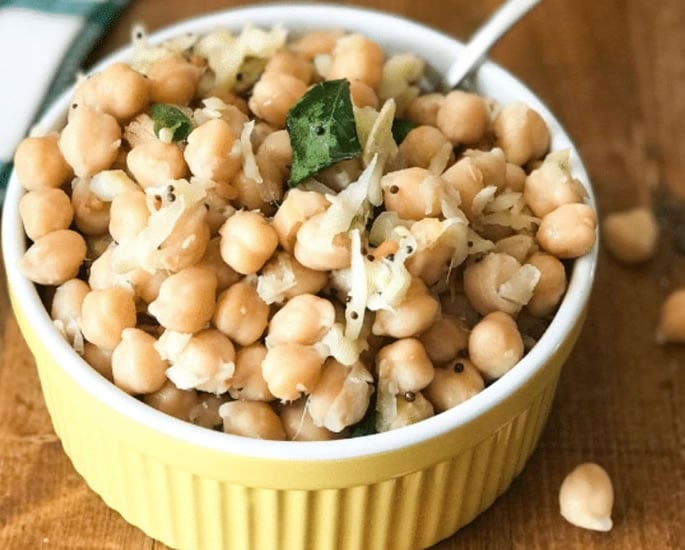
Sundal is a protein-rich snack made with legumes such as chickpeas, black-eyed peas, or even sweetcorn.
The legumes are first boiled, then sautéed with mustard seeds, curry leaves, green chillies, and fresh coconut.
Light, nourishing, and deeply rooted in tradition, sundal is often distributed as prasad during Navratri gatherings, symbolising community sharing. It also makes a wholesome, sattvic dish that fits perfectly with fasting guidelines.
Ingredients
- 1 cup legumes/dal (chickpeas, peanuts, chana dal, moong dal)
- A pinch of asafoetida
- ¼ cup coconut, grated
- Rock salt to taste
To Temper
- 2 tsp cooking oil
- ½ tsp mustard seeds
- 1 tsp urad dal
- 2 red chillies
- A pinch of asafoetida
- 1 tsp ginger, finely chopped
- 1 sprig of curry leaves
Method
- Wash the dal or legumes thoroughly in water.
- Soak the legumes overnight. If using a dal that cooks quickly, soak for about an hour instead.
- The next day, drain and cook the legumes with salt and a pinch of asafoetida until tender.
- Heat oil in a pan and splutter mustard seeds, followed by urad dal, green chilli, asafoetida, ginger, and curry leaves.
- Add the cooked and drained legumes to the pan and stir-fry well with the seasoning.
- Garnish with grated coconut and serve.
Sabudana Tikki with Paneer
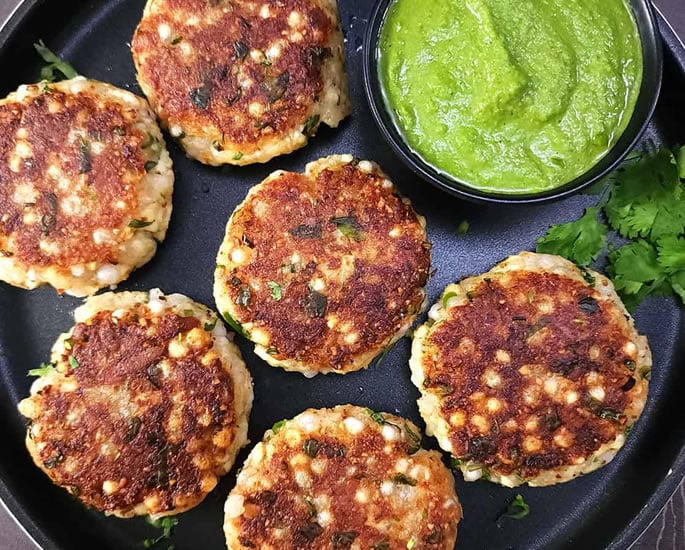
Sabudana tikki with paneer is a light, flavourful snack made with sago (tapioca pearls), potato, and paneer.
Perfect for Navratri, it adheres to fasting guidelines by avoiding grains, refined flour, and heavy dairy, while still providing energy and protein.
Crispy on the outside and soft inside, these tikkis are easy to make and make a wholesome, satisfying treat.
They also pair beautifully with chai, bringing festive flavours to the table even during fasting periods.
Ingredients
- 1 cup tapioca pearls
- 1 cup potato, boiled and mashed
- 1 tbsp ginger, grated
- 3 Green chillies, finely chopped
- ¼ cup coriander leaves, chopped
- ½ cup peanuts, roasted and crushed
- 1 tbsp lemon juice
- Rock salt to taste
- 200g paneer, grated
- Oil, for cooking
For the Chutney
- 3 tbsp coconut, grated
- ½ cup coriander leaves
- 2 tbsp mint leaves
- 3 Green chillies
- Rock salt to taste
- 2 tsp lemon juice
Method
- Wash and soak the tapioca pearls in a cup of water for at least two hours. Drain any excess water.
- In a large bowl, combine the soaked pearls with mashed potatoes, ginger, green chillies, coriander leaves, roasted and crushed peanuts, lemon juice, salt, and grated paneer. Mix well until all ingredients come together.
- Take portions of the mixture and shape them into equal-sized patties.
- Heat oil in a pan for shallow frying.
- Once hot, place the tikkis in the pan and fry over medium heat on both sides until crispy and golden brown.
- To make the chutney, add coconut, coriander leaves, mint leaves, green chillies, salt, lemon juice and a splash of water to a blender. Blend to a thick, smooth paste and serve alongside the tikkis.
This recipe was inspired by Cook With Kushi.
Beetroot Halwa
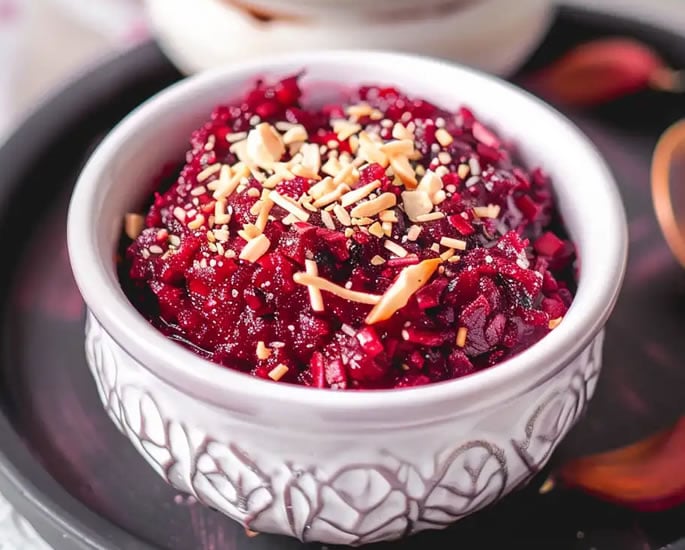
Beetroot halwa doesn’t contain refined sugar, making it perfect for Navratri.
It uses jaggery and doesn’t contain khoya, making it lighter and easier to digest.
Beetroot itself is a natural, nutrient-rich root that provides energy and sweetness, while plant-based milk or minimal ghee keeps it nourishing.
Ingredients
- 2 tbsp coconut oil
- 5 Cashews
- 1 tbsp almonds, sliced
- 5 Pistachios
- 2 cups beetroot, grated
- 2 cups plant-based milk
- ¼ cup jaggery powder
- ¼ tsp cardamom powder
- A pinch of salt
- ¼ cup almond powder (optional)
Method
- Heat coconut oil or ghee in a pan.
- Fry the cashews, almonds, and pistachios in the ghee until they turn light golden. Transfer them to a plate once done.
- Add the grated beetroot to the pan and sauté for 4-5 minutes over medium heat. Roasting the beets brings out a sweet aroma and removes the earthy scent of raw beetroot.
- Pour in the milk and bring it to a boil. Reduce the heat and simmer for 10-12 minutes, stirring regularly. The milk should reduce by 75-80%.
- Add jaggery powder, a pinch of salt, and cardamom powder. Mix well and continue cooking until the halwa thickens, turns glossy, and no longer sticks to the pan. All the milk should be absorbed by the beetroot. Optionally, add some almond flour to help thicken the halwa further.
- Finish by sprinkling the fried nuts on top. Serve hot or cold.
This recipe was adapted from Cookilicious.
Navratri is a time to celebrate tradition, flavour, and community, even while observing fasting.
These recipes show that fasting need not mean compromise. Each dish is nutritious, satisfying, and full of festive taste.
There are plenty of options to keep the fast both meaningful and delicious.
Whether shared with family or enjoyed as a personal treat, these dishes bring the spirit of Navratri to life in every bite.




















































